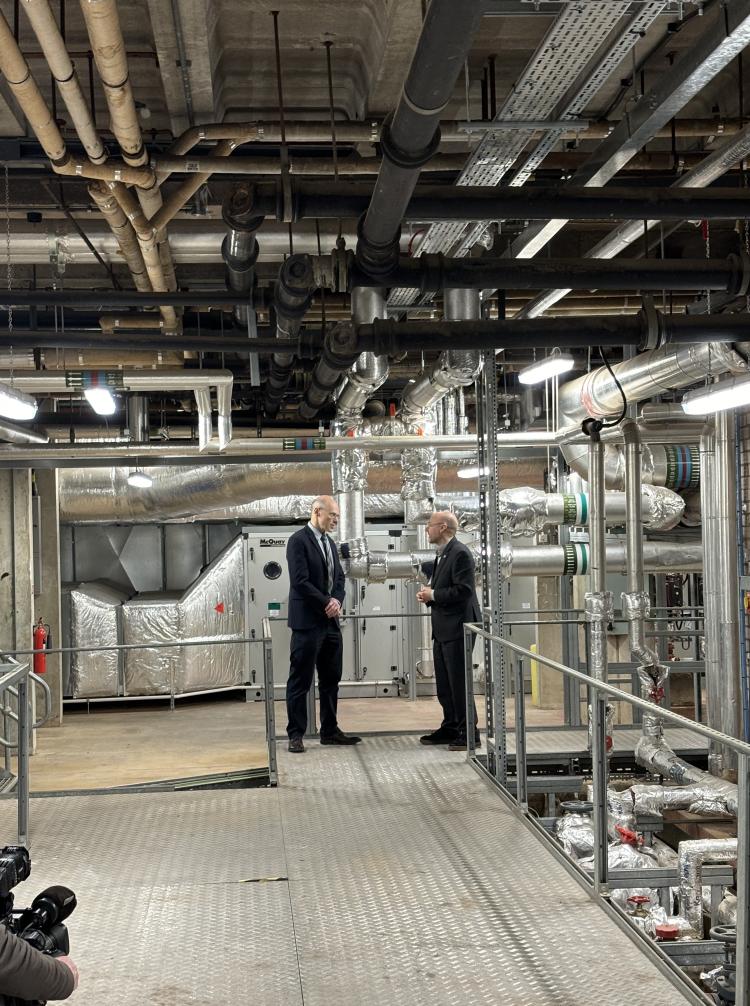Innovative university project hailed by Patrick Harvie as it wins new Scottish Government grant
Scottish Minister welcomes new decarbonisation works in Scotland funded under new green scheme
The University of Edinburgh is among public sector bodies making progress towards net zero targets, thanks to a new multi-million-pound government grant programme delivered by Salix.
Minister for Zero Carbon Buildings, Active Travel and Tenants’ Rights at the Scottish Government Patrick Harvie was at the university on Tuesday to take a first-hand look at the plans to install innovative energy-saving measures in an ambitious bid to reduce emissions.
Mr Harvie said: “Heat from our homes and buildings is responsible for around a fifth of Scotland’s overall emissions so there is no route to delivering Net Zero by 2045 without tackling this. Not just our homes but our schools, universities, offices, hospitals, and libraries also need to improve their energy efficiency and make the move to clean heating.
“We have made clear that we want all public sector buildings to have moved to clean heat by the end of 2038. We expect the public sector to demonstrate leadership in this area and I am therefore very pleased to be able to confirm these first awards from the Fund. Further awards will be confirmed shortly.”

Photo credit: Salix Finance
In the plant room, from left: Robert MacGregor, energy engineering manager at the University of Edinburgh and Minister for Zero Carbon Buildings, Active Travel and Tenants’ Rights at the Scottish Government Patrick Harvie
Scotland’s Public Sector Heat Decarbonisation Fund aims to support local authorities, universities and arm’s-length external organisations to decarbonise their buildings with a focus on heat.
The scheme, which is funded by the Scottish Government, was launched in July 2023 and opened to applications in November. Successful projects are now set to begin work.
“It’s a privilege to work with the Scottish Government on projects that will contribute to the big picture which is the significant challenge of reaching net zero and making a cleaner and more sustainable world for generations to come.”
As part of its climate fight, the University of Edinburgh has committed to reaching net zero by 2040.
To support their ambitions, the University has been awarded more than £2 million for decarbonisation works at their King’s Campus, home to the College of Science and Engineering.
The project proposes to recycle heat generated in their data centre in the James Clerk Maxwell Building. The waste heat produced by software in the data centre will be recovered and upgraded through a heat recovery heat pump and then made available for use within their district heating network.
The ambitious proposal has been hailed for its innovative approach to heat generation, with the repurposed heat set to be a foundational first for non-gas-powered heat generation into their heating network.
Catherine Martin, Vice Principal Corporate Services, University of Edinburgh said:
“The climate crisis is one of the greatest challenges we are facing. The University of Edinburgh has a clear commitment to take positive action to address our impact on the climate and ultimately reach our institutional goal of being net zero by 2040.
“We need a coordinated approach to these activities and the funding from the Scottish Government will support our efforts to generate solutions and sustainably adapt the way we operate.”
Robert MacGregor, Energy Engineering Manager at University of Edinburgh, said: “It’s a major step forward on our journey to decarbonising our heat.”
Additionally, the project will upgrade extraction fans used in key research laboratories used by chemistry students in the Christina Miller Building. The current units expel heat from the room through the fans, which increases the heat demand required for the space.
Measures funded through the grant include fabric insulation, roof insulation at popular halls of residences Grant House and Turner House, and pipework insulation upgrades.
Peter Hodgson, Energy Engineer (Projects) at the University of Edinburgh, said: “The projects are going to really help us reduce the overall carbon footprint of the campus and are going to improve the operational carbon impact of the district heating network.”

Photo credit: Salix Finance
Data centre in the James Clerk Maxwell Building
As well as the University of Edinburgh, other successful organisations to be awarded funding so far include Fife Council, Perth and Kinross Council, Scotland’s Rural College (SRUC), North Lanarkshire Council, Dumfries and Galloway Council and Edinburgh Napier University.
Salix and the Scottish Government are expected to release the full list of successful applicants later this spring.
Projects aim to support a transition away from fossil fuel-based heating by supporting works that centre around the replacement of heating systems, accompanied with retrofitting energy efficiency measures to support the overall decarbonisation of heat in buildings.
The funding for the new scheme forms part of the £200 million committed to the public sector for energy efficiency and renewable heating over the next five years from the Scottish Government.
Photo credit: Salix Finance
The University of Edinburgh
About the Scotland’s Public Sector Heat Decarbonisation Fund successful projects included to date:
1. Fife Council has been awarded £2,404,911
Two sites will be upgraded with this funding: St Andrews RC High School and Beacon Leisure Centre.
St Andrews RC High School in Kirkcaldy is a mixed-gender school for children aged from 12-18, and currently supports over 880 pupils. At this location, a combination of air-to-water heat pumps and water source heat pumps will be installed to provide heat to the building. Heat demand reductions will also be delivered through the replacement of original curtain walling and old, single-glazed windows.
Beacon Leisure Centre, situated beside the links on the seafront of coastal Burntisland, opened in 1997 and is home to a leisure pool, gym and fitness studios. At this location, a combination of air-to-water heat pumps and water source heat pumps will be installed to heat the space.
2. Scotland’s Rural College SRUC has been awarded £387,130
This project will be SRUCs' first step on their journey towards net zero. Established in 2012 through a merger of the Scottish Agricultural College with Barony, Elmwood and Oatridge Colleges, SRUC aims to be Scotland’s enterprise university at the heart of their sustainable natural economy.
The works will focus on the retrofit of buildings at their Barony Campus in Dumfries, including grade II listed Kirkmichael House, the dining hall and teaching block. Retrofit measures will employ a fabric-first approach and begin with ceiling insulation.
3. Perth and Kinross Council has been awarded £324,546
This project will focus on upgrading the existing heating supply for Auchtergaven Primary School, a small, rural school situated north of Perth in the village of Bankfoot, with just over 120 pupils on their roll from P1 through to P7.
The project centres around the installation of two air source heat pumps which will provide heat to the building. Additional measures include a building management system which will enable a room-by-room temperature and heating control, roof insulation and draughtproofing.
4. North Lanarkshire Council has been awarded £2,345,176.00
This project will redevelop the existing Strathclyde Park Watersports Centre into a ‘Net Zero Health Hub’ at the heart of the country park.
Works covered by the grant will include a whole building retrofit, redesign and modest building extension to create additional space for recreational use.
The project covers the first phase of works, which will involve rearranging and expanding the internal layout to group heated sections together so they may be insulated to further reduce heat demand.
Once complete, the works will establish one of Scotland’s premier outdoor attractions as the site of one of the nation’s flagship net zero projects. The results will also showcase how existing buildings can be repurposed, providing an exemplar for future projects as the council continue the journey towards their net zero 2030 ambitions.
5. Edinburgh Napier University has been awarded £1,241,966.00
This project will focus on upgrades at the BE-ST innovation centre (Built Environment – Smarter Transformation, formerly Construction Scotland Innovation Centre).
Hosted by Edinburgh Napier University, BE-ST is an international centre for excellence that collaborates across the entire built environment and ecosystem to bring stakeholders together to accelerate the transition to zero carbon.
The project focuses on a full retrofit of their A Lab, which hosts a national retrofit academy, a skills academy and outreach programmes.
Retrofit elements include the removal of their existing gas-based fossil fuel system, as well as mechanical ventilation and heat recovery. Accompanying energy efficiency measures include upgrades to the curtain wall system, LED lighting controls. The project will also install a renewable energy source via solar PV.
The project is expected to act as a test bed for the wider university estate, and to provide a living case study for built environment stakeholders in Scotland to visit, learn from and replicate.
6. Dumfries and Galloway Council has been awarded £2.5 million
The Dumfries Ice Bowl is a popular community venue, home to a dedicated ice hockey and skating rink, and a six-rink curling pad. It is a major sports hub serving all levels, from grassroots coaching to international curling and hockey tournaments, as well as figure skating.
The project focuses on building upgrades through the replacement of the mains gas system with a low emission water source heat pump with heat recapture technology. This will allow heat generated from the refrigeration system that cools the ice to be repurposed to provide heat for the space, reducing the need for a separate heating system.
Accompanying energy efficiency measures will focus on upgrading external fabrics to improve insulation and air tightness.
7. The University of Edinburgh has been awarded £2,079,459
This project will focus on reducing the heat demand at four key university buildings across the university’s estate, namely the James Clerk Maxwell Building and Christina Miller Building at their Kings Campus, and halls of residences Grant and Turner House in the city.
Works at the James Clerk Maxwell Building will focus on the installation of a heat recovery heat pump which will take previously redundant heat generated by software in the data centre and re-purpose it for use in the heat distribution network.
Works in the Christina Miller Building will focus on upgrading the extraction fans used in key chemistry research laboratories. The current units expel desired heat from the rooms through the fans, which then required further heat to be generated to keep the space to temperature.
Additional energy efficiency works will be undertaken at halls of residences Grant House and Turner House, focusing on fitting roof insulation which will support not only a reduction to heat demand, but will also make the halls a warmer, more comfortable living environment for the students who reside there.
To be sure you don’t miss any of our updates, sign up for our email newsletter for Scotland.

